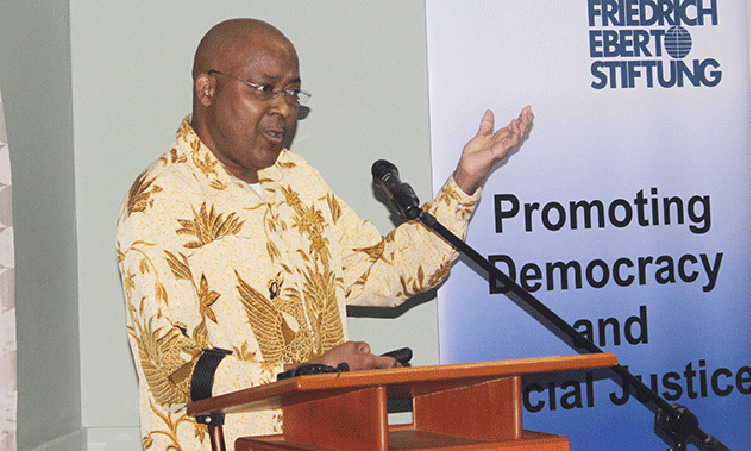… Economist questions competition commission’s ability to investigate banks on price fixing
Social justice activists say Namibian banks found guilty of credit and debit card user fees price fixing should be punished.
This comes after the Namibian Competition Commission (NaCC) released a report on Friday showing that commercial banks and the Payment Association of Namibia (PAN) were working together to set fees for debit and credit card transactions – a practice deemed anti-competitive and prohibited by law.
The commission concluded its investigation against the PAN and nine registered commercial banks over allegedly collaborating on interchange fees, giving rise to possible price fixing.
The NaCC’s investigation found that First National Bank of Namibia (FNB) and Standard Bank Namibia adopted a payment clearing house card schedule, setting interchange fees from 2014 to 2020.
The commission believes this agreement could have driven up the cost of these transactions for consumers and businesses in Namibia.
Herbert Jauch from the Economic and Social and Justice Trust (ESJT) says this has severe implications for consumers who are forced to pay these fees.
“This directly affects their available cash. The worst affected are low-income earners who pay a proportionately larger share in banking fees compared to wealthier clients,” he says.
Jauch says price fixing practices by commercial banks are particularly outrageous as banks make huge profits and impose their fees on consumers, many of whom are struggling to survive.
“Banks should not only be held accountable, but severely punished for their antisocial practices. Namibians certainly deserve to see some justice done,” he says.

Nafimane Hamukoshi, also from ESJT, says when banks collude to set interchange fees, it could result in artificially inflated prices for consumers, especially in industries where electronic payments are common, like retail and online shopping.
“Moreover, if interchange fees are set at unfairly high levels, it may discourage smaller businesses to accept card payments, which could affect consumer convenience and access to certain products or services,” she says.
Hamukoshi says it is essential for banks to be held responsible for engaging in anti-competitive practices such as price fixing.
She says competition laws are designed to ensure fair and competitive markets, which ultimately benefit consumers by encouraging innovation, lowering prices and offering more choices.
“Holding banks accountable for violating these laws helps maintain fairness and protects the interests of consumers,” Hamukoshi says.

‘TENDENCY TO COLLUDE’
Meanwhile, economist Omu Kakujaha-Matundu says commercial banks in Namibia are operating under an oligopolistic market structure, and therefore there is always a tendency to collude.
“Bank clients are usually detrimentally affected since the motivation behind collusion by banks is to make maximum profits,” he says.
Kakujaha-Matundu’s concern is whether the NaCC has the capacity to control collusive behaviour in such a complicated and complex rate-setting landscape.
“Proving that price fixing exists is one thing, but ensuring that collusion by commercial banks ceases, is another. It may prove very difficult to control such collusive oligopolistic behaviour,” he says.
The Bank of Namibia as a regulator yesterday said it would issue a formal response on the allegations of price fixing faced by commercial banks today.
“FNB Namibia acknowledges the [receipt] of a notice of pending investigation from the competition commission and will be taking up the accompanying invitation for all named banks to submit individual feedback as directed,” FirstRand Namibia’s chief marketing officer, Tracy Eagles, said yesterday.
Natangwe Ithete, the chairperson of the parliamentary standing committee on economic and public administration, said the committee has not yet received and discussed the outcomes of the NaCC investigation.
He said prior to this revelation, the committee had already engaged both commercial banks and the NaCC regarding unfair practices by banks.

He said the committee has since been busy with a report which will be submitted to the parliament for discussion.
Ithete has previously accused commercial banks of engaging in “mafia” tactics.
On Friday, the competition commission announced the results of an investigation which revealed the alleged collusion.
“The commission found that the parties involved agreed on the fees charged for processing card transactions. This agreement may have prevented the banks from setting their own fees, which could have potentially led to lower costs for consumers,” NaCC spokesperson Dina //Gowases said.
The commission said no legal instrument providing for the setting of interchange fees by the parties currently exists.
As such, the commission said the banks cannot negotiate their own fees with each other.
Instead, all participants in the network pay the same fees as agreed on by the industry.
The commision is giving the banks and PAN 30 days to respond to the allegations.
“This conduct undermines fair market practices by replacing independent pricing with agreed-upon fees,” //Gowases said.
“The banks and PAN can either agree with our findings, or argue that their actions were legal. We are also open to discussing a possible settlement to avoid going to court,” she said.
If the commission’s accusations are upheld, the banks and PAN could face fines.
The commission proposed potential penalties of up to 10% of turnover for the infringing parties, and are also seeking a court order to prevent commercial banks from agreeing on fees in the future.
“We believe competition between banks is important for driving down the cost of financial services,” //Gowases said.
Stay informed with The Namibian – your source for credible journalism. Get in-depth reporting and opinions for
only N$85 a month. Invest in journalism, invest in democracy –
Subscribe Now!






